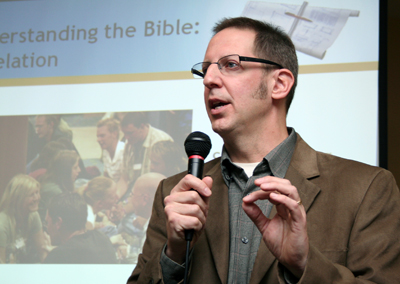
 COLUMBIA—Reading and studying the Bible is a crucial part of developing an intimate relationship with Christ. But for too long, Catholics were not encouraged to read the Bible, according to Joe Paprocki, national consultant for faith formation at Loyola Press in Chicago.
COLUMBIA—Reading and studying the Bible is a crucial part of developing an intimate relationship with Christ. But for too long, Catholics were not encouraged to read the Bible, according to Joe Paprocki, national consultant for faith formation at Loyola Press in Chicago.
His childhood was a classic example.
“Like all good Catholics we had a Bible, and like all good Catholics we never read it,” he said. “I tell that story and laugh as a way to keep from crying. Back then, Catholics were taught to keep a Bible in the home almost as an insurance policy, but weren’t taught to read it. I describe it as being biblically deprived.”
Paprocki was the featured speaker for “The Catholic Approach to the Bible: How Catholics Hear and Proclaim the Word,” a Feb. 6 education session sponsored by the Office of Catechesis and Christian Initiation for the Diocese of Charleston. The talk drew about 85 catechists, directors of religious education and parish volunteers to the St. Peter Church Bernardin Center.
He said it is significant that church teaching in recent years has emphasized the importance of reading and studying the Bible because of Scripture’s role in helping Catholics learn about the very foundations of their faith.
“Scripture summarizes God’s attempt to enter into a relationship with us,” he said. “Sometimes we think too much of the Bible as a history book or a science book. Through Scripture, God reveals himself in words and actions, all in hope of revealing himself to his people. He knows us intimately already and is inviting us to reciprocate. We go to the Bible to meet Jesus Christ. We find a relationship that is the key to salvation.”
Paprocki is the author of several books, including “The Bible Blueprint” and “A Well Built Faith: A Catholic’s Guide to Knowledge and Sharing What We Believe.” He also blogs about his work as a catechist at http://catechistsjourney.loyolapress.com.
He stressed that the Catholic approach to Scripture differs from some Protestants and other Christian groups who tend to view the Bible as an all-purpose answer book for even the smallest life situation.
“In Catholic tradition, the Bible is intended for us to pray with,” he said. “We study it so it will make our prayer more fruitful.”
Catholics also approach Scripture as one of the treasured foundations of their belief, along with church teaching and tradition through the magisterium.
Paprocki said this is a key difference from the Protestant tradition, which stresses the Bible as its only foundation, illustrated by the Latin term, sola scriptura.
He said there are also important differences between the way Protestant fundamentalists and Catholics interpret the Bible. Fundamentalists take every word of the Bible literally, while Catholics learn that Scripture contains both accurate history and truths illustrated with figurative language.
“The Catholic approach says we know not everything in the Bible was meant to be taken as fact,” he said. “Scripture sometimes employed the kind of figurative language we use all the time. That’s why when we read Scripture we need help. We need Bible commentaries, dictionaries and concordances. For anyone to think we can completely understand Scripture without help is extreme arrogance.”
He used the creation story in Genesis as an example. Fundamentalists, he said, will insist that God created the earth and the universe in seven 24-hour days, just as it is written in the book.
“We know that science clearly shows otherwise, and Catholics are taught Genesis does not seek to provide a scientific explanation of creation,” he said. “Through it, we learn that God creates good things and God blesses all of creation. We as Catholics don’t have to choose sides between creation and evolution, because we know that Genesis teaches us the religious truth of creation, while science teaches us how it came about.”
Another example is the story of Jonah being swallowed by a large fish.
“God gave us the story of Jonah to show us what happens when God invites us to follow his will and we run away,” he said. “He knew the story would teach us something important.”
Paprocki said while some Christians say God himself wrote every word of the Bible, Catholic teaching states that God inspired the writing and worked through the many varied authors.
“God’s fingerprints are all over it,” he said.
He described how to divide the Bible into specific sections so readers can understand the purpose of the books within them.
As an example, he said, the often complicated Old Testament is easier to understand when people realize the first five books, the Pentateuch, tell the story of the foundations of God’s relationship with the people of Israel. Books that convey history, wisdom and the writings of the prophets follow.
Paprocki said it’s important to learn how to find specific sections and stories in the Bible quickly, because then Scripture can be used more effectively in daily prayer.
The talk gave Rita Schoene, a catechist for young people at St. John the Beloved Church in Summerville, some new teaching tools.
“I feel like this has been a day of being saturated in the word of God,” she said. “I’ve realized what a wonderful opportunity I now have to teach children how to use the Bible in learning about their faith.”
